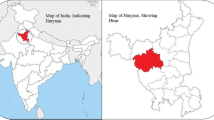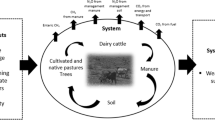Abstract
Purpose
The carbon footprint for the downstream dairy value chain, milk collection and dairy processing plants was estimated through the contribution of emissions per unit of collected and processed milk, whereas that for the upstream dairy value chain, input supply and production was not considered. A survey was conducted among 28 milk collectors and four employees of processing plants. Two clusters were established: small- and large-scale milk collectors. The means of carbon dioxide equivalent per kilogramme (CO2-eq/kg) milk were compared between clusters by using independent sample t-test.The average utilisation efficiency of milk cooling refrigerators for small- and large-scale collectors was 48.5 and 9.3%, respectively. Milk collectors released carbon footprint from their collection, cooling and distribution practices. The mean kg CO2-eq/kg milk was 0.023 for large-scale collectors and 0.106 for small-scale collectors (p < 0.05). Milk processors contributed on average 0.37 kg CO2-eq/kg milk from fuel (diesel and petrol) and 0.055 from electricity. Almi fresh milk and milk products processing centre emitted the highest carbon footprint (0.212 kg CO2-eq/kg milk), mainly because of fuel use. Generally, in Ziway-Hawassa milk shed small-scale collectors released higher CO2-eq/kg milk than large-scale collectors.




Similar content being viewed by others
References
Ahmedin, A., & Negasi, A. (2018) Prospects of climate change on livestock production. Journal of Scientific and Innovative Research 7(4), 100–105. https://www.jsirjournal.com/Vol7_Issue4_04.pdf.
Azeze, T., & Haji, B. (2017). Assessment of knowledge gap and constraints affecting consumption of standardized dairy products in Sidama and Gedeo Zone, Southern Ethiopia. Journal of Scientific and Innovative Research 6, 25–32.https://doi.org/10.31254/jsir
Brander, M., Sood, A., Wylie, C., Haughton, A., & Lovell, J. (2011). Electricity-specific emission factors for grid electricity. Ecometrica emission factors.com. https://ecometrica.com/assets/Electricity-specific-emission-factors-for-grid-electricity.pdf. Accessed 20 June 2018.
Daneshi, A., Esmaili-Sari, A., & Daneshi, M. (2014). Greenhouse gas emissions of packaged fluid milk production in Tehran. Journal of Cleaner Production, 80, 150–158. https://doi.org/10.1016/j.jclepro.
FAO (Food and Agriculture Organization of the United Nations). (2018). Supporting Africa to halve food loss. https://www.fao.org/news/story/en/item/1141224/icode/
FAO and NZAGRC. (2017). Supporting low emissions development in the Ethiopian dairy cattle sector – reducing enteric methane for food security and livelihoods. Food and Agriculture Organization, New Zealand Agricultural Greenhouse Gas Research Centre, FAO and NZAGRC publishing. https://www.fao.org/3/a-i6821e.pdf.
FAO. (2010). Greenhouse Gas Emissions from the Dairy Sector—A Life Cycle Assessment.
FDRE. (Federal Democratic Republic of Ethiopia). (2011). Ethiopia’s Climate-Resilient Green Economy. https://www.undp.org/content/dam/ethiopia/docs/Ethiopia%2520CRGE.pdf.
Flysjö A (2012) Greenhouse gas emissions in milk and dairy product chains. Dissertation, Aarhus University
Gebre, T. (2016). CO2 emission level in urban transport of Mekelle City, Ethiopia. Journal of Environment and Earth Sciences 6, 64–71. https://doi.org/10.7176/JEES.
GTPII. (Growth and Transformation Plan Two). (2015). Second Growth and Transformation Plan of the Federal Democratic Republic of Ethiopia. Capacity 4dev.eu publishing Europe Aid web. https://dagethiopia.org/new/docstation/com_content.article/100/gtp_ii_policy_matrix_english_final__august_2016.pdf.
Guercia, M., Proserpio, C., Famigliettic, J., Zanchic, M., & Bilato, G. (2016). Carbon Footprint of Grana Padano PDO cheese in a full life cycle perspective. https://sites.unimi.it/agrifood_lcalab/wp-content/uploads/2016/10/Lca_food_2016_finale.pdf.
Haile, D. (2018). Supporters services and private sector to scale up climate-smart dairy in Ziway-Hawassa Milk Shed, Ethiopia. Thesis Master Agricultural Production Chain Management. Van Hall Larenstein University of Applied Sciences, the Netherlands.
Hailemariam, S. (2018). Opportunities for scaling up climate smart dairy production in Ziway-Hawassa Milk Shed, Ethiopia. Thesis Master Agricultural Production Chain Management. Van Hall Larenstein University of Applied Sciences, the Netherlands.
Hawkins, C. L., Bacher, S., Essl, F., Hulme, P. E., Jeschke, J. M., Kuhn, I., et al. (2015). Framework and guidelines for implementing the proposed IUCN Environmental Impact Classification for Alien Taxa. A Journal of Conservation and Biogeography, 21, 1360–1363. https://doi.org/10.1111/ddi.12379.
Hill, J. P. (2017). Assessing the overall impact of the dairy sector.BurleighDodds Science Publishing. https://shop.bdspublishing.com/store/bds/detail/product/3–190–9781786760487–020.
Huysveld, S., Van Linden, V., De Meester, S., Peiren, N., Muylle, H., Lauwers, L., et al. (2015). Resource use assessment of an agricultural system from a life cycle perspective-a dairy farm as case study. Agricultural Systems, 135, 77–89. https://doi.org/10.1016/j.agsy.2014.12.008.
Shapiro, B.I., Gebru, G., Desta, S., Negassa, A., Nigussie, K., Aboset, G., & Mechal, H. (2015). Ethiopia livestock master plan. International Livestock Research Institute (ILRI) Project Report. Nairobi, Kenya. https://cgspace.cgiar.org/bitstream/handle/10568/68037/lmp_roadmaps.pdf?sequence=1.
Mantyka-Pringle, C.S., Visconti, P., Di Marco, M., Martin, T.G., Rondinini, C., & Rhodes, J.R. (2015). Climate change modifies risk of global biodiversity loss due to land-cover change. Biological Conservation 187, 103–111.https://doi.org/10.1016/j.biocon.2015.04.016.
Nutter, D. W., Kim, D. S., Ulrich, R., & Thomas, G. (2013). Greenhouse gas emission analysis for U.S. fluid milk processing plants: Processing, packaging, and distribution. International Dairy Journal, 31, 57–64. https://doi.org/10.1016/j.idairyj.2012.09.011.
Ritchie, H. (2019). Global Greenhouse gas emissions from food production. Food Production is responsible for one quarter of the world’s greenhouse gas emissions. https://ourworldindata.org/food-ghg-emissions.
Rojas-Downing, M., Nejadhashemi, A., Harrigan, T., & Woznicki, S. A. (2017). Climate change and livestock: Impacts, adaptation, and mitigation. Climate Risk Management, 16, 145–163. https://doi.org/10.1016/j.crm.2017.02.001.
Tezera, B. (2018). Carbon footprint of milk at smallholder dairy production in Ziway-Hawassa Milk Shade, Ethiopia. Thesis APCM. Thesis Master Agricultural Production Chain Management. Van Hall Larenstein University of Applied Sciences, the Netherlands.
Thomas, G., Popp, J., Nutter, D., Shonnard, D., Ulrich, R., Matlock, M., et al. (2013). Greenhouse gas emissions from milk production and consumption in the United States: A cradle-to-grave life cycle assessment. International Dairy Journal, 31, 3–14. https://doi.org/10.1016/j.idairyj.2012.08.013.
Torquati, B., Taglioni, C., & Cavicchi, A. (2015). Evaluating the CO2 emission of the milk supply chain in Italy: An exploratory study. Sustainability, 7, 7245–7260. https://doi.org/10.3390/su7067245.
Ulrich, R., Thomas, G. J., Nutter, D. W., & Wilson, J. (2012). Tailpipe greenhouse gas emissions from tank trucks transporting raw milk from farms to processing plants. International Dairy Journal, 31, 50–56. https://doi.org/10.1016/j.idairyj.2012.09.009.
Vergé, X. P. C., Maxime, D. A., Dyer, J., Desjardins, R. L., Arcand, Y., & Vanderzaag, A. (2013). Carbon footprint of Canadian dairy products: calculations and issues. Journal of Dairy Science, 96, 6091–6104. https://doi.org/10.3168/jds.2013-6563.
Zhao, R., Xu, Y., Wen, X., Zhang, N., & Cai, J. (2017). Carbon footprint assessment for a local branded pure milk product: a lifecycle-based approach. Food Science Technology, 38, 98–105. https://doi.org/10.1590/1678-457x.02717.
Acknowledgements
The Netherlands Fellowship Program (NFP) financed by Nuffic and the project “Inclusive and Climate Smart Business Models in Ethiopian and Kenyan Dairy Value Chains (CSDEK)” financed by the Netherlands Organization for Scientific Research (NWO) are acknowledged for their support.
Funding
This study was funded by the Netherlands Fellowship Program (NFP) financed by Nuffic and the project “Inclusive and Climate Smart Business Models in Ethiopian and Kenyan Dairy Value Chains (CSDEK)” financed by the Netherlands Organization for Scientific Research (NWO).
Author information
Authors and Affiliations
Corresponding author
Ethics declarations
Conflict of interest
The authors declare that they have no conflict of interest.
Additional information
Publisher's Note
Springer Nature remains neutral with regard to jurisdictional claims in published maps and institutional affiliations.
Rights and permissions
About this article
Cite this article
Misganaw, G., Baars, R., Verschuur, M. et al. Carbon footprint in the downstream dairy value chain in Ziway-Hawassa milk shed, Ethiopia. Environ Dev Sustain 23, 8348–8364 (2021). https://doi.org/10.1007/s10668-020-00968-8
Received:
Accepted:
Published:
Issue Date:
DOI: https://doi.org/10.1007/s10668-020-00968-8




